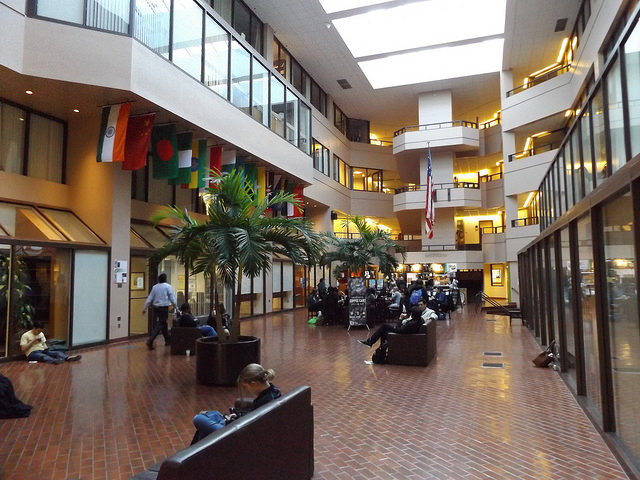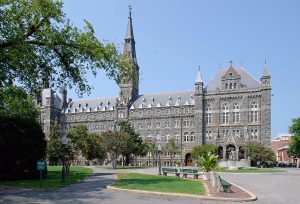After spending the summer releasing statements about its dedication to principles of anti-racism and inclusion, Georgetown’s School of Foreign Service (SFS) is beginning to take steps towards concrete change.
Professor Scott Taylor was appointed as the SFS first vice dean for diversity equity and inclusion by Dean Joel Hellman, according to an email sent by Hellman on July 28. Taylor started the position on Aug. 15 and has since developed a plan to implement the school’s commitment to global anti-racism. The SFS’s original commitment to global anti-racism responded to a call to action for the SFS to confront institutional racism in light of nationwide protests in response to the police killing of Black individuals such as George Floyd and Breonna Taylor.
To Taylor, the goal of the SFS’s anti-racist agenda is to produce a better pool of leaders who reflect global diversity and engage more effectively with differing perspectives. “The students we’re educating, leaders in U.S. domestic politics and politics of other countries, in business, in the private sector, in NGOs, and throughout communities in the U.S. and abroad would look more like the world,” he said.
“Leaders will be more sensitized to why understanding race and anti-racism is important. I think that will produce better foreign policy actors, better businesspeople, and better civil society actors who are more acutely aware of differences and discrimination.”
Before beginning his new position, Taylor identified three key goals the school could reach for: a more diverse faculty and student body, a more inclusive school culture, and more diversity within the SFS curriculum.
Taylor has since spoken about the actions he has taken to implement these commitments. “In the past few weeks, I have had the opportunity to hear from students, faculty and staff in the SFS,” he said in an email sent to members of the school on Sept. 8. “I have begun to form partnerships with the many administrators and units across the University whose work deals with addressing racism, bias and other forms of discrimination.”
In addition to working with administrators, Taylor noted in an interview with the Voice that he sees engaging with Georgetown’s programs, centers, and ad-hoc committees dedicated to promoting diversity, equity, and inclusion as an equally important task. “My role is to help coordinate some of these initiatives, to lead some of these initiatives, to import best practices, and to be a resource for students of color and allies in whatever way,” he said.
Taylor cited self-assessments from the SFS to evaluate the school’s adjunct faculty, course selection, and syllabi, as an important goal suggested by these groups. “There are a lot of great ideas and activities already coming out of our programs and centers. (crossover99.com) Even before this position, they’ve been pushing forward,” he said.
One area Taylor believes needs improvement is the relatively unrepresentative composition of the student body, specifically the low numbers of Black and Latinx students in the SFS. “It diminishes us as a domestic institution, reflects a lack of opportunity to have access to a Georgetown and SFS education,” he said. “These are the future leaders, so we need to be in the world and look like the world.”
Hellman also emphasized the importance of a diverse student body. “We do not have enough students that reflect the diversity of our country and the world,” he said. “As a school of international affairs that tries to bring in diverse perspectives to discover innovative ways to solve global problems, we need much wider representation at all levels.”
Another area Taylor cited as lacking representation was faculty composition. “This isn’t just a matter of checking boxes, but it’s important that the SFS look like the country and look like the world in which we’re living.”
Taylor also hopes to make an increased diversity of perspectives within the classroom a priority, noting the importance of ensuring class syllabi and course offerings reflect the variety of ideas within international relations scholarship. “
We are in the process of providing reading lists and supplements for syllabi that my colleagues may consider,” he said. “It’s about info-sharing and exposure. There’s been a whole lot of new sources emerging that may have been overlooked but now are getting a second look.”
According to Hellman, living up to the new commitment to anti-racism is especially important for a school dedicated to producing global leaders in international affairs.
“If we get more diverse students, faculty, and curriculum, they will be streamed into a river that more seriously understands the extent to which racism, injustice, and inequality shape international affairs,” he said. “If we have a community that tackles those problems head on, we’ll have a richer, more creative, and more innovative education in international affairs.”






[…] the importance of the program, and he said the study of Africa is a key component of the SFS’ push for diversity, equity and […]
[…] the importance of the program, and he said the study of Africa is a key component of the SFS’ push for diversity, equity and […]